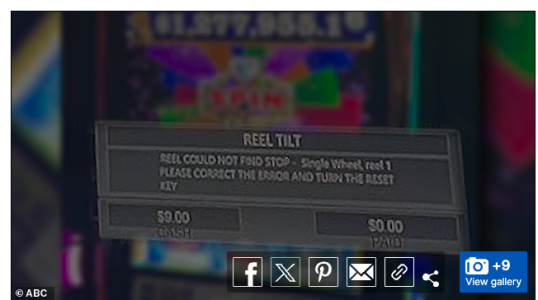I understand the key to the Louisiana case was that the memory was lost in the machine before it go to a testing lab. They had one trial that ended in a mistrial and another than ended in a 10-2 jury verdict for the plaintiff. But the key was that they couldn't go in and find which random number was generated for that play, and thus they relied on witness accounts and security video that the payline hit the progressive jackpot. I think another question was whether or not they paid the max bet required for the progressive payout.
In the instant case, we find that there is sufficient evidence to support the jury's finding of fact that a jackpot was, in fact, won by the plaintiffs. Four people testified that they saw the indicia of a jackpot win. They described in detail what they saw, and their descriptions of what they observed matched the descriptions given by IGT's witnesses of how the Wheel of Fortune slot machine visually and aurally indicates that a jackpot has been won. The jury could well have concluded that the outward manifestation of a jackpot win was evidence that the computer inside the Wheel of Fortune slot machine had caused the win to occur through its random number generation. We also note that Mr. Oatman, the engineer who conducted the forensic testing of the microprocessor from the Wheel of Fortune slot machine at GLI, admitted that if, in fact, a surveillance videotape had clearly shown that the three Wheel of Fortune symbols had remained aligned and in position on the payline for twenty seconds, he would question his forensic data.
IGT's position that a winning combination for a jackpot must be the result of computerized random number generation is legally correct. Had the forensic testing of the Wheel of Fortune's microprocessor shown that random number generation had occurred, there would have been no dispute that the jackpot in this case was won. Both the forensic evidence and the eyewitness testimony would have matched. Although there was forensic evidence that a jackpot win did not occur, there was the testimony of four eyewitnesses that a win did occur.
IGT contends that its forensic evidence is conclusive regarding whether or not a jackpot was won. Nevertheless, even IGT's witnesses admitted that nothing is infallible. Additionally, the plaintiff's expert, Mr. Rich, explained that there are ways that the data from the game in which the plaintiffs allegedly won the progressive jackpot could have been lost prior to the delivery of the computer's microprocessor to the GLI testing laboratory. He testified that when the power to a slot machine is turned off and then turned on again, it is possible to lose the data of the game that was last played. Also, Mr. Oatman, who performed the forensic testing, admitted that on the videotape of the forensic testing, he said at one point that the data had been lost. Although he claimed that he misspoke when he said that, the jury could have determined that he did not misspeak and that the data of the winning game had been lost.
The jury weighed the evidence and concluded that the evidence presented by the plaintiffs had more probative value than the evidence presented by IGT. The jury may have also made credibility determinations regarding the veracity of the testimony of the witnesses. Thus, we cannot say that the jury's decision was clearly wrong or manifestly erroneous. Therefore, even if we disagree with the jury, we cannot substitute our judgment for the factual determination made by the jury. See Rosell, 549 So.2d at 844.
IGT also asserts in its assignment of error that the law prohibits the payment of a jackpot when a slot machine has malfunctioned. In the instant case, however, the plaintiffs do not disagree that a malfunction or reel tilt occurred in the Wheel of Fortune machine. They are simply claiming that the malfunction occurred after the completion of the game in which they allegedly won the progressive jackpot. The bet is wagered when the game is played, and when the game is completed, the result is final. A machine malfunction that occurs subsequent to a jackpot being legitimately won does not invalidate the jackpot. The phrase “any malfunction voids all plays and pays” that was displayed on the Wheel of Fortune slot machine clearly does not apply to a play that has been completed or to a jackpot that has already been won prior to the malfunction.
